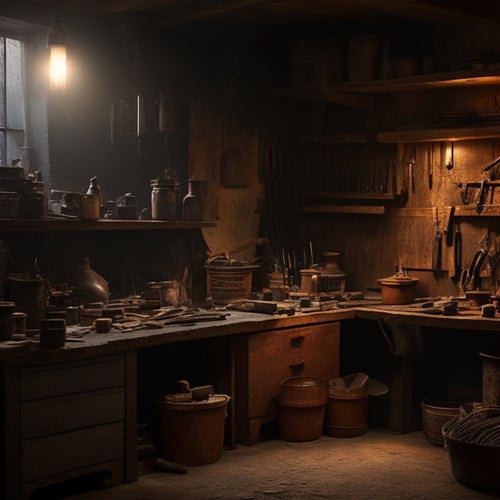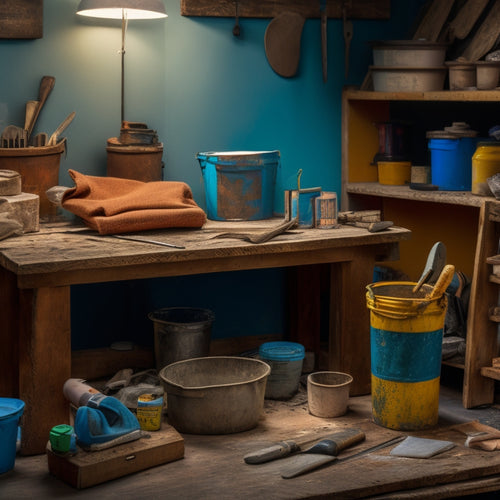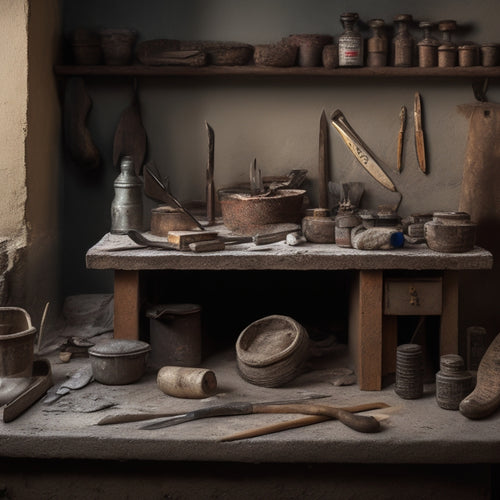
Flooring Material Costs for Your Home Renovation Budget
Share
As you plan your home renovation, allocating the right budget for flooring materials is essential, with costs ranging from under $1 to over $15 per square foot, depending on the type, quality, and aesthetics you choose. Cement floors, for instance, can be durable and affordable, starting at $1 per square foot, while hardwoods and luxury vinyl tiles can be pricier, with costs escalating to $15 per square foot or more. Laminate and tile options fall somewhere in between. Considering factors like underlayment, installation, and maintenance will help you make an informed decision - and getting a clear picture of your options can lead to a beautiful, budget-friendly floor that exceeds your expectations.
Key Takeaways
• Cement floor material costs range from $1 to $5 per square foot, depending on type and finish.
• Hardwood flooring prices vary from $3 to $15 per square foot, based on species, grade, and finish.
• Laminate flooring costs range from $0.50 to $2 per square foot, depending on realism and durability.
• Tile flooring material expenses vary from $0.50 to $15 per square foot, based on type and quality.
• Luxury vinyl flooring material costs range from $0.50 to $5 per square foot, depending on product and brand.
Cement Floor Cost Breakdown
When calculating the cost of a cement floor, you'll need to take into account the price of the materials, which can range from $1 to $5 per square foot, depending on the type of cement and finish you choose. A basic, unfinished cement floor might be on the lower end of that spectrum, while a high-gloss, polished finish could push the cost upwards.
Additionally, you'll need to consider the cost of any necessary underlayment, such as a vapor barrier or insulation, which can add up to $1 per square foot.
However, the benefits of a cement floor make it a worthwhile investment. Not only are they extremely durable, but they're also low maintenance. Cement floor maintenance is a breeze, requiring only regular sweeping and occasional mopping to keep it looking its best.
This means you'll save money in the long run on cleaning products and replacement costs. Plus, cement floors can be stained or painted to match any aesthetic, making them a versatile and stylish choice for any room.
Hardwood Flooring Price Range
As you weigh the pros and cons of cement flooring, you may be pondering alternative options, like hardwood, which can bring a touch of warmth and sophistication to your space at a cost that ranges from $3 to $15 per square foot, depending on the species, grade, and finish you select.
Hardwood flooring benefits include its durability, ease of maintenance, and ability to increase your home's value. When it comes to hardwood installation tips, it's crucial to reflect on the subfloor preparation, as an uneven surface can lead to costly repairs down the line. Additionally, choosing the right finish can make a significant difference in the overall look and feel of your space.
Here are some factors to examine when budgeting for hardwood flooring:
-
Species: Exotic hardwoods like Brazilian walnut or African mahogany can cost upwards of $10 per square foot, while domestic species like oak or maple can be more budget-friendly.
-
Grade: Higher-grade hardwoods with fewer imperfections will cost more than lower-grade options.
-
Finish: A high-gloss finish can add an extra $1 to $2 per square foot to your total cost.
- Installation: Labor costs can range from $2 to $5 per square foot, depending on the complexity of the installation.
Laminate Flooring Cost Factors
You'll find that laminate flooring costs are largely driven by its ability to mimic natural materials, with prices ranging from $0.50 to $2 per square foot, depending on the level of realism and durability you're after. As you explore different options, consider the visual details that will make a big impact on the overall aesthetic. For instance, laminate flooring with intricate patterns or textures that replicate natural wood will typically cost more than simpler designs.
When calculating the total cost, don't forget to factor in installation expenses, which can range from $1 to $3 per square foot, depending on the complexity of the job and the location.
Additionally, think about maintenance considerations, such as how easy the flooring is to clean and repair. Laminate flooring that's more resistant to scratches and fading will likely require less upkeep, but may come at a higher upfront cost.
Tile Flooring Material Expenses
With laminate flooring out of the way, your focus shifts to tile flooring, where the material costs can vary widely depending on the type, quality, and brand you choose. Ceramic and porcelain tiles range from $0.50 to $15 per square foot. When selecting tile, reflect on not only the upfront cost but also the long-term benefits, such as durability and low maintenance.
Here are some essential factors to reflect on when budgeting for tile flooring:
-
Tile quality and brand: High-end tiles can cost upwards of $15 per square foot, while more budget-friendly options start at $0.50.
-
Tile size and shape: Larger tiles may be more expensive than smaller ones, and unique shapes can increase the cost.
-
Tile installation tips: Hiring a professional can add to the overall cost, but it's essential for a successful installation.
- Tile maintenance costs: While tile is generally low maintenance, you'll still need to budget for occasional cleaning products and potential repairs.
Luxury Vinyl Flooring Costs
Luxury vinyl flooring costs vary considerably depending on the specific product and brand you select, ranging from $0.50 to $5 per square foot for materials alone. As you consider luxury options, remember that installation expenses will add to the overall cost. On average, installation can range from $1 to $3 per square foot, depending on the complexity of the job and the installer's rates.
Here's a breakdown of luxury vinyl flooring costs:
| Product Type | Cost per Square Foot |
|---|---|
| Basic Luxury Vinyl | $0.50 - $1.50 |
| Mid-Range Luxury Vinyl | $1.50 - $3.00 |
| High-End Luxury Vinyl | $3.00 - $5.00 |
When calculating your total cost, don't forget to factor in additional expenses, such as underlayment, connection strips, and adhesives. These can add up quickly, so be sure to budget accordingly. By understanding the costs associated with luxury vinyl flooring, you can make an informed decision that fits your renovation budget.
Frequently Asked Questions
Can I Install New Flooring Over Existing Flooring?
You're wondering if you can install new flooring over existing flooring? Well, it's possible, but it depends on the flooring types and installation methods.
For instance, you can install hardwood or laminate over existing hardwood, but not over carpet or tile.
Additionally, some underlayment requirements might vary.
It's essential to assess the condition of your existing floor and choose the right installation method to guarantee a successful and cost-effective renovation.
How Do I Measure My Room for Flooring Material?
Imagine walking into a perfectly measured room, where every plank fits snugly. To achieve this, you'll need to get out your tape measure and calculator!
Measure your room's length, width, and any obstructions, like heating vents or doorways. Use a room dimensions calculator to guarantee accuracy.
Then, choose your flooring measurement techniques: will you measure in squares, linear feet, or by the sheet?
Are Flooring Materials Pet-Friendly and Durable?
When choosing flooring, you'll want pet-friendly options that withstand scratches and stains.
Compare durability by considering factors like scratch resistance, moisture tolerance, and maintenance needs.
For instance, hardwoods like oak and maple are durable, but may require more upkeep than low-maintenance options like ceramic tile or luxury vinyl.
Prioritize your needs and budget to find the perfect balance between style and practicality.
Can I DIY Flooring Installation to Save Money?
Did you know that 67% of homeowners take on DIY projects to save money?
When it comes to flooring installation, you're probably wondering if going the DIY route is a good idea. The benefits are clear: you'll save on labor costs and have complete control over the project.
To get started, you'll need the right flooring tools, like a pry bar, tape measure, and utility knife.
With some patience and elbow grease, you can achieve a professional-looking result without breaking the bank.
What Is the Average Lifespan of Different Flooring Materials?
When you're choosing flooring, you're thinking about the long haul. You want to know how long your new floors will last.
The flooring lifespan varies greatly depending on the material durability. For instance, hardwood floors can last up to 50 years with proper maintenance, while laminate floors typically last around 10-20 years.
Ceramic tiles can go up to 20-30 years, and natural stone floors can last a lifetime.
You're investing in your home, so consider the material's lifespan when making your decision.
Conclusion
You've made it to the final step of planning your dream floor!
With this guide, you're now equipped to tackle your home renovation budget with confidence.
Did you know that, according to the National Association of Home Builders, the average homeowner spends around 10% of their renovation budget on flooring?
Make every dollar count by choosing the perfect flooring material for your style and budget.
With these cost breakdowns, you're ready to make an informed decision and bring your vision to life.
Related Posts
-

Why Invest in Quality Plastering Tools for Renovation
When renovating, investing in quality plastering tools is essential for achieving professional-looking results and mi...
-

DIY Plastering Supply Checklist for Home Renovation
To tackle a DIY plastering project for your home renovation, you'll need a solid checklist of supplies. Start with es...
-

Stucco Tool Kit Checklist for Home Renovation
You'll need a thorough stucco tool kit to guarantee a successful home renovation, as the right tools can make all the...


